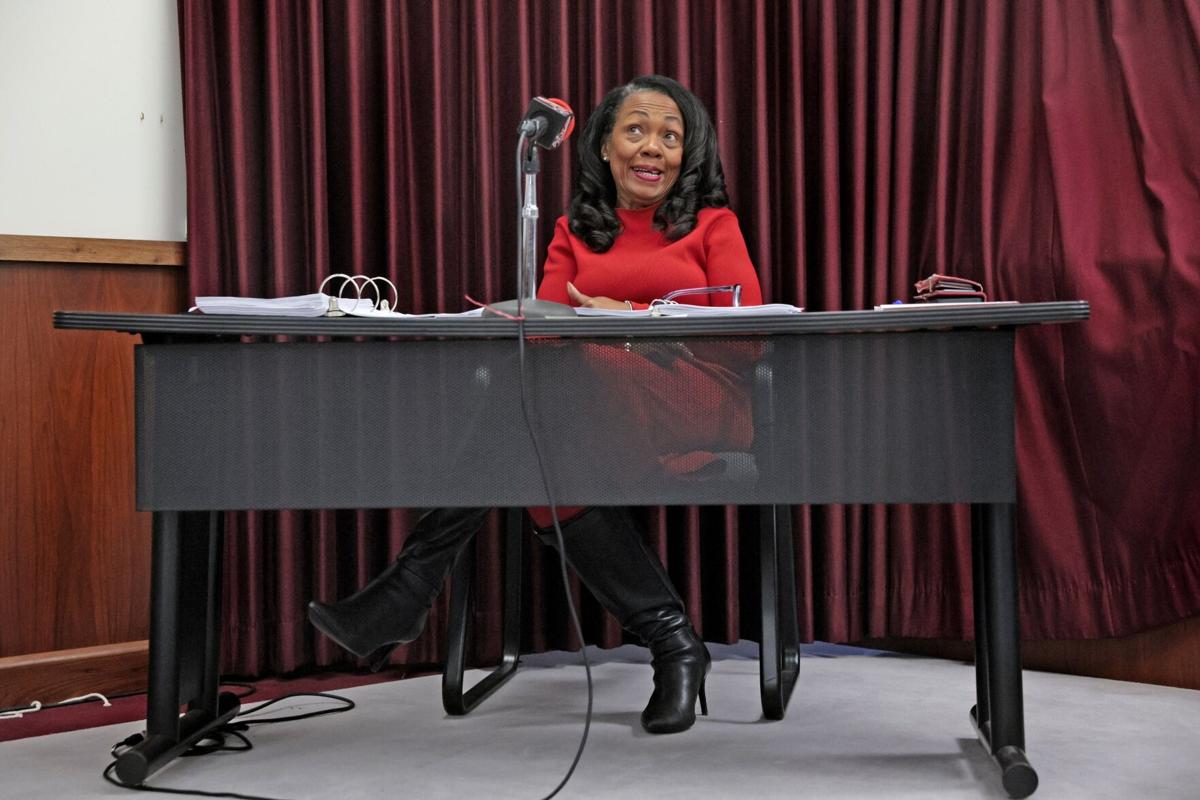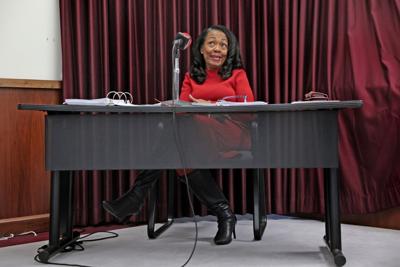ST. LOUIS ÔÇö Mayor Tishaura O. Jones has been trying to fire the head of the cityÔÇÖs human resources department since last summer, when her office learned that Personnel Director Sonya Jenkins-Gray had an employee drive her to the state capital with a city car to confront her husband, the Rev. Darryl Gray.
But while the lengthy Civil Service Commission hearings have focused on the circumstances of Jenkins-GrayÔÇÖs trip to Jefferson City, theyÔÇÖve also shown how hard it is to remove the head of a department that holds broad power over the hiring, firing and promotion of thousands of city employees.
No mayor has ever tried before to oust someone from the uniquely independent and protected city job. And after the last several months, future mayors may think twice before trying again.
The unprecedented hearing has forced the Civil Service Commission to try and flesh out rules for a process laid out in just a couple sentences of the cityÔÇÖs charter. And the ensuing spectacle has proven time-consuming and distracting. At the rate theyÔÇÖre going, a decision on hiring or firing the director wonÔÇÖt even come until a week before the first round of the mayoral election in March, at the earliest.
People are also reading…
Jenkins-GrayÔÇÖs supporters, many of them members of the clergy like her husband, have rallied behind her and against the mayor. Other critics of the mayor have attended the hearings, including firefighter union bosses and Comptroller Darlene Green. Personnel department employees and managers, tasked with trying to fill positions in an understaffed city, regularly sit in on the hearings, gasping at the details aired about coworkers. The mayorÔÇÖs top officials, including Chief of Staff Jared Boyd and Deputy Chief of Staff Sara Baker, have sat through hours of testimony.
Yet ousting Jenkins-Gray, which the mayor may be able to do regardless of what the commission decides, would give Jones the opportunity to unilaterally install an acting director in the powerful position under rules she pushed through early in her term. With the mayoral election fast approaching, a more cooperative pick could help the administration install its people for a new term ÔÇö or keep allies in city jobs should the mayor lose.
Jenkins-GrayÔÇÖs lawyer, Ron Norwood of Lewis Rice, has characterized the hearings as a ÔÇ£hostile takeoverÔÇØ of the cityÔÇÖs civil service system, driven by politics and a refusal by Jenkins-Gray to bend hiring and promotion rules to the mayorÔÇÖs wishes.
ÔÇ£ItÔÇÖs more than just her,ÔÇØ he said of Jenkins-GrayÔÇÖs job at the commission hearing Jan. 15. ÔÇ£ItÔÇÖs 4,500 civil servants that will be impacted by what you do.ÔÇØ
The mayorÔÇÖs office contends it was left with little choice but to try and fire Jenkins-Gray when it learned the details of the incident and heard reports that the driver, chief administrative officer Anthony Byrd, was given a raise and job reclassification shortly after the trip. Jenkins-GrayÔÇÖs team has maintained that the job reclassification was in process well before the July 3 trip to Jefferson City.
ÔÇ£The underlying offense wasnÔÇÖt just about the mileage, it was about unknowingly taking your subordinate and putting him in a precarious position,ÔÇØ Boyd, the mayorÔÇÖs chief of staff, testified Wednesday. ÔÇ£As a leader of a department, as the leader of our city HR department, that seemed to be a gross violation of judgment.ÔÇØ
The mayorÔÇÖs office may not have envisioned Jenkins-Gray fighting this hard, nor the hearings stretching this close to the election. Boyd testified he gave Jenkins-Gray the option to resign back in August, given the ÔÇ£uniquely public processÔÇØ for firing a director. ThatÔÇÖs what the administration hoped would happen, Norwood said, painting the move to push her out as political retribution for her husbandÔÇÖs outspokenness on the jail oversight board and his decision to back Wesley Bell for Congress over Jones ally Cori Bush.
ÔÇ£Fall on your sword, or else weÔÇÖre going to embarrass the hell out of you,ÔÇØ Norwood said at the hearing Wednesday. ÔÇ£WeÔÇÖre going to get into your personal business. WeÔÇÖre going to talk about your husband sneaking around. WeÔÇÖre going to drag all that into this public hearing. ThatÔÇÖs political interference.ÔÇØ
ÔÇÿPlease quit wasting timeÔÇÖ
The hearings were originally supposed to start in early September, but Jenkins-Gray abruptly went out on medical leave the day Boyd told her they would be initiating pre-termination proceedings. She stayed out of the office for more than two months, delaying the start of a public hearing the charter says must occur before the director can be fired.
Meanwhile, Jenkins-Gray lawyered up, and her attorney spent the time she was out filing confidential motions with the Civil Service Commission to disqualify the City CounselorÔÇÖs office from participating, block the mayorÔÇÖs office from investigating and otherwise stop the hearing from happening.
Then, the chair of the Civil Service Commission resigned, citing the time commitment. And after the commission finally tried in early December to set a public hearing, Jenkins-GrayÔÇÖs lawyer sued to block it. Even when a judge allowed the hearing to begin, the weather wouldnÔÇÖt cooperate. A snowstorm canceled the first day of the hearing Jan. 6 and delayed Jenkins-GrayÔÇÖs arrival by more than an hour the following day.
By the time the Civil Service Commission started ÔÇö down to two members after another resignation of one of the mayorÔÇÖs appointees ÔÇö it was forced to conduct them without a template. It tapped retired judge Edward Sweeney to try and keep order as a hearing officer.
ÔÇ£This is an unprecedented process,ÔÇØ Sweeney said as the two sides argued over a schedule Wednesday. ÔÇ£The City Charter lays out the open hearing, and thatÔÇÖs all it says really.ÔÇØ
Norwood began the administrative hearings Jan. 7 by objecting to the rules for the examination of witnesses, the public notice of the hearing and even the appointment of Sweeney to keep order. They veered into performance art early on while a TV camera rolled and media watched. At one point Norwood raised a bag of $170 in cash, the amount Jenkins-Gray reimbursed the city for mileage for the Jefferson City trip, claiming he was being ÔÇ£muzzledÔÇØ and that he was willing to be escorted out by sheriffÔÇÖs deputies for defending his client. Sweeney tried to keep the hearing moving.
ÔÇ£ThereÔÇÖs no right of your client that was denied,ÔÇØ a frustrated Sweeney told Norwood the first day. ÔÇ£So please quit wasting time and quit filibustering.ÔÇØ
Other process issues arose. As the commission sought to wade through hearing rules and procedure, it discussed motions from each side in private, an apparent violation of the Missouri Sunshine Law. There was no notice of a closed session on its public hearing notices when it asked the public to leave the room on Jan. 15 so it could discuss whether to allow questions about the personal reasons for Jenkins-GrayÔÇÖs Jefferson City trip. The Post-Dispatch objected. Later that afternoon, the commission again told a Post-Dispatch reporter to leave so it could discuss motions. There was no notice of a closed session or a vote to go into closed session.
Sweeney at first said the public did not have a right to observe the minutiae of the commissionÔÇÖs rule setting for the hearing. But since then, the commission has begun voting to go into closed meetings and posting notice on its agendas that it may enter closed session, as required by the stateÔÇÖs open records law.
ÔÇÿThis ainÔÇÖt a court of lawÔÇÖ
Between the open records rules and the challenges Norwood has already lodged about the process, a lawsuit from Jenkins-Gray seems inevitable should she be fired. Norwood, Sweeney and the cityÔÇÖs attorney, Reggie Harris of law firm Stinson, have all but said thatÔÇÖs the matter is likely to end up in court whenever they finish.
Concluding the hearing in a timely manner, however, is proving difficult. On Tuesday, after several days of testimony, the commission approved a motion from the cityÔÇÖs lawyer, Harris, to set time limits on witness testimony and cross-examination.
ÔÇ£YouÔÇÖre sort of changing the rules in the middle of the game,ÔÇØ Norwood protested. ÔÇ£Here we are in the middle of this thing and weÔÇÖre being hamstrung.ÔÇØ
And on Wednesday, the two sides spent hours arguing over scheduling and the witnesses Jenkins-Gray could call. Harris argued whole weeks were going by without meeting and questioned whether Norwood and Jenkins-Gray were being genuine about conflicts that prevented them from appearing. He pushed the commission to have them prove they could not make time for hearings.
Commissioner Vincent Flewellen was also impatient, grousing that he was missing too much time at his job as a vice president at Webster University.
ÔÇ£Your workday, sir, is being billed by the hour, mine is not,ÔÇØ Flewellen told Norwood.
At one point, the commission was poised to hold a hearing Feb. 7 even though Norwood said he would be in Columbia, Missouri, to teach a class at the University of Missouri School of Law. Norwood threatened to get a writ from circuit court to block the hearing.
ÔÇ£This ainÔÇÖt a court of law,ÔÇØ Norwood fumed. ÔÇ£And this is as kangaroo-ish as IÔÇÖve ever seen in my life.ÔÇØ
The commission ultimately decided to let Norwood have that Friday to teach after being assured the defense could wrap up its witnesses by Feb. 11 following three more days of hearings. After that, each side will have two weeks to submit final briefs to the commission, which will have another week to send to the mayor a recommendation on whether Jenkins-Gray should be fired. The due date for the commissionÔÇÖs recommendation, assuming the hearings actually conclude Feb. 11, would be March 4, the day of the first round of the mayoral election.
Whatever the commission decides, it may not matter. The hearing could be just a formality. The charter simply says the commission will send a recommendation to the mayor on whether the personnel director should be removed from office and that the mayor can ÔÇ£accept or reject the recommendation of the civil service commission and his decision shall be final.ÔÇØ
If the mayor rejects a recommendation to not fire the director, does that mean Jenkins-Gray still loses her job? There is no precedent or case law on that question ÔÇö yet.
Post-Dispatch photographers capture hundreds of thousands of images each year. Take a look at some from from just one week. Video edited by Jenna Jones.






















